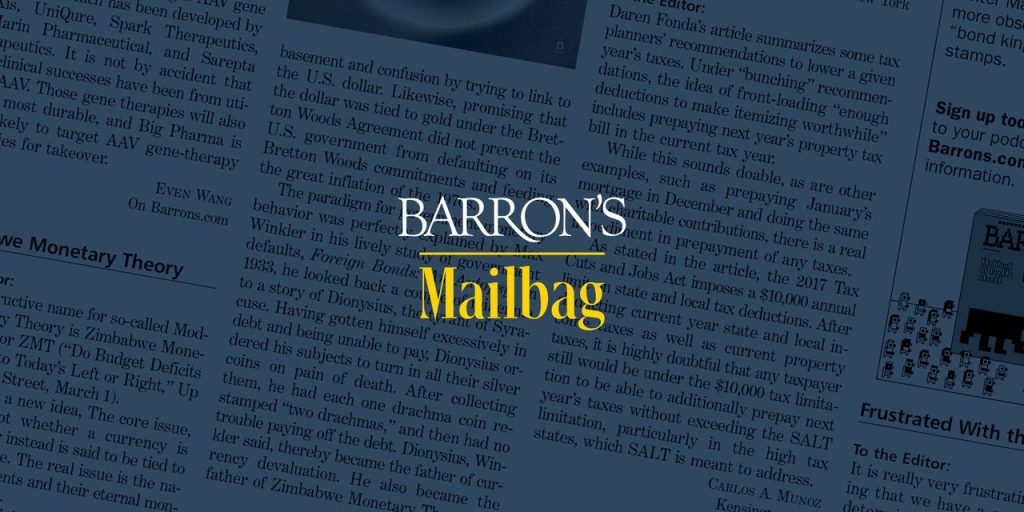To the Editor:
The most alarming part of this article (“What’s Ahead for TikTok,” Cover Story, March 31) is that the average American spends 90 minutes a day on this brain-rotting poison. Ban TikTok!
To the Editor:
I don’t understand all the hand-wringing in Washington over TikTok. If lawmakers want it out of the hands of most Americans without looking like they’re legislating against young voters, just give it time. Once millennial parents take to it, the kids will be on to something new.
Paul Antico, On Barrons.com
The Facts, Please
To the Editor:
I think that the parties who are advocating the banning of TikTok need to back up their arguments with facts, and give a detailed analysis of those facts indicating why TikTok is a national-security hazard (“Gen Z Is Ticked Off About a Possible TikTok Ban. Beware the Fallout,” March 31). Then Gen Z would probably be on board.
Thomas Rogers, On Barrons.com
Data Privacy
To the Editor:
While I understand the sovereign data-security issues around TikTok, I think this needs to be part of a much larger conversation around personal data privacy (“How a TikTok Ban Might Play Out,” March 31). Of course, that includes Meta Platforms’ Facebook and Alphabet’s Google. But the biggest three offenders are never mentioned. They are Experian, TransUnion, and Equifax. The big three are picking up and collecting a ridiculous amount of personal data and have no oversight.
John Saxton,On Barrons.com
Closed-End Funds
To the Editor:
Randall W. Forsyth cites the closed-end debt fund recommendations of Colliers Securities’ Mark Grant as Nuveen Floating Rate Income, BlackRock Floating Rate Income Strategies, and Barings Global Short Duration High Yield (“Not All Low-Rated Bonds Are Created Equal. What to Buy and What to Avoid,” Up & Down Wall Street, March 31).
This echoes Forsyth’s column of July 29, 2022, which also cited Mark Grant’s CEF selections (“10 Funds That Beat Inflation and Offer Steady Monthly Income”). However, Forsyth once again omits some important information of which any potential investor should be aware. The leverage on the BlackRock CEF is 24%; on the Barings CEF, 27%; and on the Nuveen CEF, 39%. Caveat emptor.
Harvey Rosen,Brooklyn, N.Y.
Bank Risk Factors
To the Editor:
Good to see Barron’s highlighting risk factors prospectively and not in a postmortem (“These 15 Banks Have a Risky Specialty. It Isn’t a Problem—So Far,” March 31). This is a story that needs to be drilled down on more, particularly its relevance to office-space loans. The valuations of certain properties based upon prepandemic vacancy rates and the shift to remote work deserve close scrutiny.
William Milaccio, On Barrons.com
Housing Bubble
To the Editor:
Prices overall are still rising year over year in the long-lasting inflation of residential real estate, and the bubble is alive and well, as interest rates continue to be negative in relation to the real inflation rate (“Don’t Expect the Housing Market to Crash. A Slow Rebound Is Coming, Our Roundtable Pros Say,” March 30).
The Federal Reserve will continue to flood the economy with helicopter money, one way or another, to keep the bubble from bursting, creating ever-greater widespread misallocation of resources in an economy that is increasingly mismanaged, leading to ever more divisiveness and eventual social breakdown.
Our free-enterprise system is under increasingly severe stress and challenged.
James Grey,On Barrons.com
Let’s Be Frank
To the Editor:
Sure, let’s blame crypto for the bank run at Signature (“Barney Frank Says He Tried to Save Signature Bank,” March 31). Perhaps if Frank had spent anywhere near the time chastising Signature Bank Chairman Scott Shay on the bank’s 89% of uninsured deposits as he has in denying any responsibility for the debacle, maybe all of those customers wouldn’t have felt so compelled to stampede. Maybe, too, stockholders and regulators might have less confusion over the ethics of Frank’s raising the “$50 billion asset threshold to help the bank” and stockholders like himself.
Martin G. Mutsch,Wyckoff, N.J.
Dollar vs. Yuan
To the Editor:
I agree that, head to head, the U.S. dollar beats the yuan. However, that isn’t the fight that looks to be emerging (“The Dollar Rules the Financial Universe. China Can’t Change That,” Other Voices, March 31). The BRICS [Brazil, Russia, India, China, and South Africa] are pushing toward a regional currency backed by gold and other rare metals. China will be front and center in the effort, but it might not be just China or its yuan that is taking aim at dollar. It seems to be a regional bloc that, in turn, will leverage the physical scarcity of a 6,000-year-old, neutral monetary asset.
Adam Manus, On Barrons.com
Send letters to: mail@barrons.com. To be considered for publication, correspondence must bear the writer’s name, address, and phone number. Letters are subject to editing.
Read the full article here



